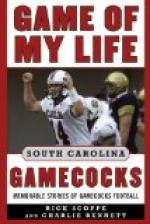A short time after this, in the time of the war, in the year 1863, when a man was going round to the different plantations gathering slaves from their masters to carry off to work on fortifications and to wait on officers, there were ten slaves sent from Mrs. Singleton’s plantation, and I was among them. They carried us to Sullivan’s Island at Charleston, S.C., and I was there all of that year. I thanked God that it afforded me a better chance for an education than I had had at home, and so I was glad to be on the island. Though I had no one to teach me, as I was thrown among those of my fellow negroes who were fully as lame as I was in letters, yet I felt greatly relieved from being under the eye of the overseer, whose intention was to keep me from further advancement. The year after I had gone home I was sent back to Fort Sumpter—in the year 1864. I carried my spelling book with me, and, although the northerners were firing upon us, I tried to keep up my study.
In July of the same year I was wounded by the Union soldiers, on a Wednesday evening. I was taken to the city of Charleston, to Dr. Regg’s hospital, and there I stayed until I got well enough to travel, when I was sent to Columbia, where I was when the hour of liberty was proclaimed to me, in 1865. This was the year of jubilee, the year which my father had spoken of in the dark days of slavery, when he and mother sat up late talking of it. He said to mother, “The time will come when this boy and the rest of the children will be their own masters and mistresses.” He died six years before that day came, but mother is still enjoying liberty with her children.
And no doubt my readers would like to know how I was wounded in the war. We were obliged to do our work in the night, as they were firing on us in the day, and on a Wednesday night, just as we went out, we heard the cry of the watchman. “Look out.” There was a little lime house near the southwest corner of the fort, and some twelve or thirteen of us ran into it, and all were killed but two; a shell came down on the lime house and burst, and a piece cut my face open. But as it was not my time to die, I lived to enjoy freedom.




